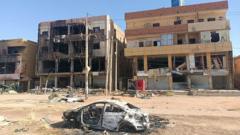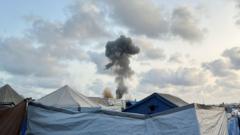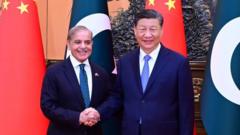Amid rising casualties in Gaza and growing international outrage, the UK, France, and Canada have issued strong condemnations of Israel's military operations, demanding an end to the offensive while highlighting the urgent humanitarian crisis developing in the region.
UK, France, and Canada Demand Immediate Cessation of Israeli Offensive in Gaza

UK, France, and Canada Demand Immediate Cessation of Israeli Offensive in Gaza
Diplomatic relations tense as international allies urge Israel to halt military actions in Gaza.
Israeli Defense Forces (IDF) attacks have led to thousands of casualties since Israel resumed military action in Gaza following the Hamas attacks on October 7, 2023. Originally backed by significant goodwill from its allies, Israel now finds itself facing severe diplomatic repercussions from nations such as the United Kingdom, France, and Canada. The three governments publicly condemned Israel's military strategy, citing the intolerable level of human suffering in Gaza and urging a ceasefire.
Prime Minister Benjamin Netanyahu has framed the conflict as a necessary effort to dismantle Hamas and secure the safe release of hostages. However, the leaders of France, the UK, and Canada have dismissed his assertions, advocating instead for a halt to the violence. They contend that civilian suffering has escalated significantly, which is an unacceptable consequence of the military operations meant to counter terrorism.
The humanitarian situation in Gaza deteriorated substantially, with only a meager five trucks of aid entering the territory recently, amidst continuous military strikes that have reportedly resulted in numerous civilian deaths. Netanyahu's attempt to allow food supplies into Gaza has drawn ire not only from international leaders but also from hardline members of his coalition, who feel any concessions could embolden Hamas while hostage situations remain unresolved.
Criticism of Israel's actions grew further after a heartbreaking incident on March 23, when an Israeli military convoy attacked and killed 15 paramedics and aid workers. This tragedy prompted increased international scrutiny, leading to a significant shift in language from Israel's traditional allies, who now state that they "will not stand by" as humanitarian laws and civilian rights are allegedly violated.
The ramifications of these escalating tensions could be substantial, as European leaders contemplate concrete actions if Israel fails to de-escalate and improve humanitarian access. The discussions include a potential shift in diplomatic relations, such as recognizing Palestine as an independent state.
Against this backdrop of growing indignation, Netanyahu remains firm in his stance, claiming that Israel cannot accept anything less than the complete disarmament of Hamas and the return of hostages. The global community waits to see how Israel will respond to the mounting pressure from its allies, particularly as the humanitarian crisis deepens.
Prime Minister Benjamin Netanyahu has framed the conflict as a necessary effort to dismantle Hamas and secure the safe release of hostages. However, the leaders of France, the UK, and Canada have dismissed his assertions, advocating instead for a halt to the violence. They contend that civilian suffering has escalated significantly, which is an unacceptable consequence of the military operations meant to counter terrorism.
The humanitarian situation in Gaza deteriorated substantially, with only a meager five trucks of aid entering the territory recently, amidst continuous military strikes that have reportedly resulted in numerous civilian deaths. Netanyahu's attempt to allow food supplies into Gaza has drawn ire not only from international leaders but also from hardline members of his coalition, who feel any concessions could embolden Hamas while hostage situations remain unresolved.
Criticism of Israel's actions grew further after a heartbreaking incident on March 23, when an Israeli military convoy attacked and killed 15 paramedics and aid workers. This tragedy prompted increased international scrutiny, leading to a significant shift in language from Israel's traditional allies, who now state that they "will not stand by" as humanitarian laws and civilian rights are allegedly violated.
The ramifications of these escalating tensions could be substantial, as European leaders contemplate concrete actions if Israel fails to de-escalate and improve humanitarian access. The discussions include a potential shift in diplomatic relations, such as recognizing Palestine as an independent state.
Against this backdrop of growing indignation, Netanyahu remains firm in his stance, claiming that Israel cannot accept anything less than the complete disarmament of Hamas and the return of hostages. The global community waits to see how Israel will respond to the mounting pressure from its allies, particularly as the humanitarian crisis deepens.




















